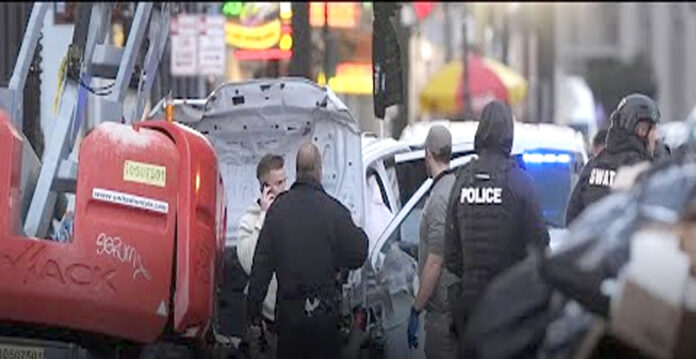The United States has been left shaken by a series of violent incidents as the new year begins, raising urgent concerns about extremism, gun violence, and public safety. Three high-profile attacks in New Orleans, New York, and Las Vegas within days of each other have claimed lives, injured dozens, and sparked nationwide debate on the causes and solutions to such violence.
In New Orleans, a truck-ramming attack resulted in the deaths of 15 people and left 30 others injured. The attacker, identified as Shamsud Din Jabbar, drove a truck bearing an ISIS flag into a crowded area. The vehicle was found to contain weapons and potential improvised explosive devices. Jabbar was killed in a shootout with law enforcement, and the FBI has labeled the attack an act of terrorism. This incident highlights the persistent threat of international terrorism and the role of radicalization in driving such acts of violence.
In New York, a shooting at the Amazura nightclub in Queens injured several people late Wednesday. Although the motive behind the attack remains unclear, the incident has reignited debates over the dangers of the nation’s permissive gun culture and the resistance to implementing stricter gun control measures.
Also Read: Saudi Arabia Condemns Deadly Attack on Christmas Market in Germany
In Las Vegas, a Tesla Cybertruck explosion outside a hotel owned by President-elect Donald Trump claimed one life and injured seven others. Investigators are exploring possible ideological motives and mental health challenges linked to the attacker, reflecting a troubling trend in lone-wolf incidents where individuals act independently under the influence of extremist ideologies or personal grievances.
Despite the differences in the nature of these incidents, all three share critical commonalities. The attackers targeted densely populated or high-profile locations to maximize casualties and media attention. The adaptability of their methods, ranging from the use of vehicles and firearms to explosives, underscores the complexities of preventing such violence.
The motivations behind these attacks appear to stem from intersecting factors. Jabbar’s actions in New Orleans point to the enduring threat of radicalization fueled by extremist propaganda and online networks. The Queens shooting illustrates the hazards of widespread firearm accessibility and the lack of effective gun control laws. Early findings from the Las Vegas explosion suggest that mental health challenges, combined with ideological leanings, played a role in the attack.
The implications of these incidents are far-reaching. Experts are calling for enhanced surveillance measures, particularly of online platforms used to spread extremist propaganda. Gun control advocates argue that even modest steps to regulate firearm access are long overdue, especially given the repeated mass shootings that continue to claim innocent lives. Addressing mental health issues and providing community support are also critical to mitigating the risk of future lone-wolf attacks.
As the nation grapples with the aftermath of these tragedies, there is a growing recognition that a multifaceted approach is essential to tackle the root causes of violence. While law enforcement agencies acted swiftly to prevent further casualties, the broader societal challenges require sustained attention and a united effort to foster resilience and security.
(This story is sourced from a third-party syndicated feed. Raavi Media takes no responsibility or liability of any nature. Raavi Media management/ythisnews.com can alter or delete the content without notice for any reason.)


